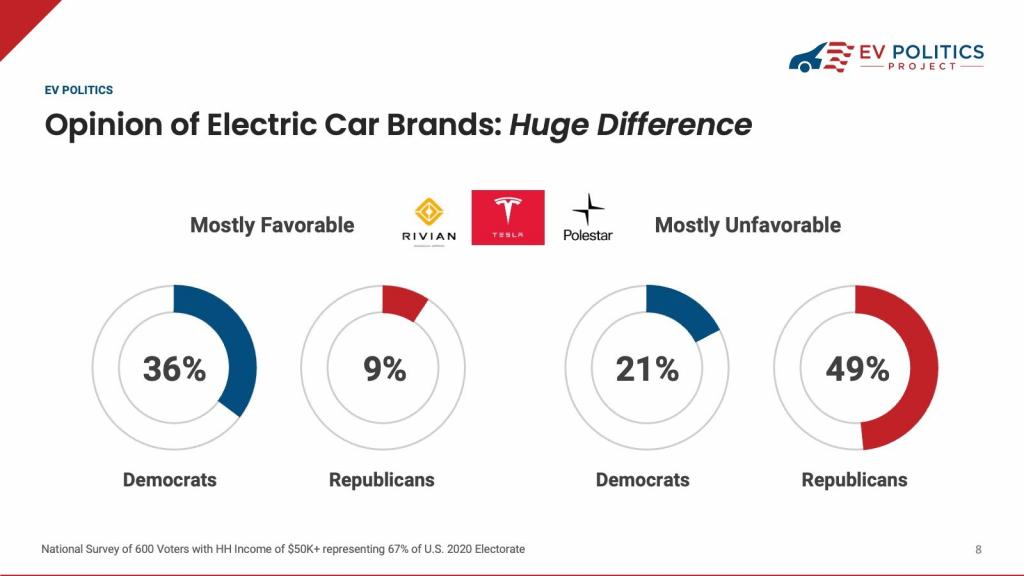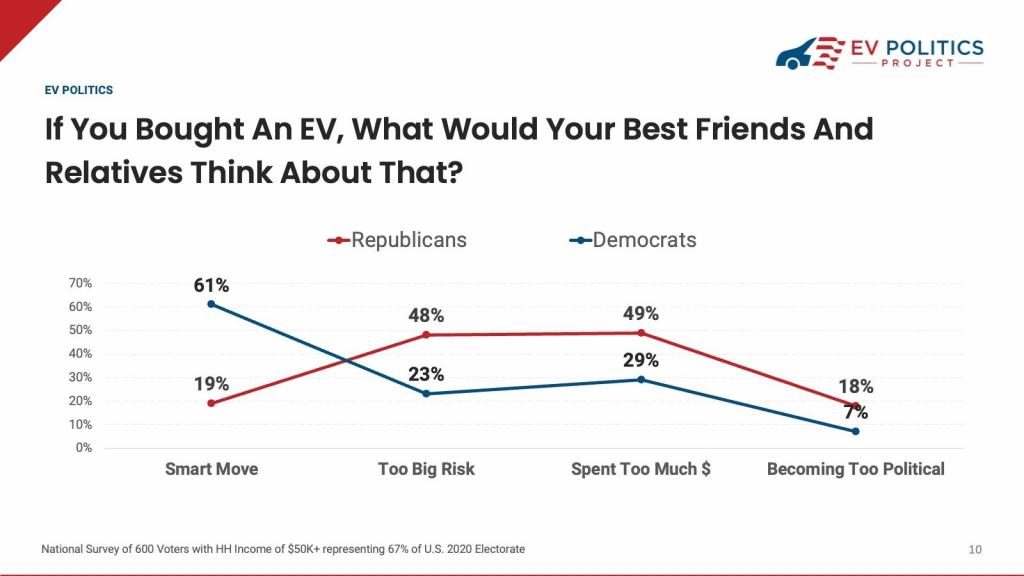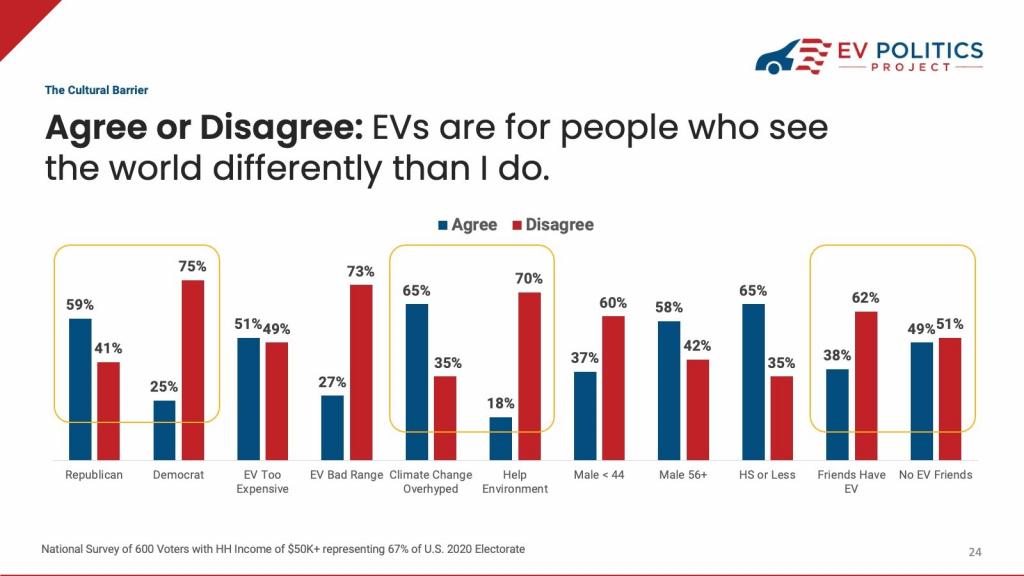Donkeys, Elephants and EVs
It is no surprise that our politics have become tribal and deeply polarized. The EV Politics Project was created to better understand the deep partisan division over, of all things, electric vehicles. But that divide does exist and it is wide and growing. The EVPolitics Project recently conducted a national political campaign style poll. Our goal was to explore the fast rising Red State Curtain that is closing off a huge part of the American auto market to EVs. The slides below begin to tell the story. The first slide shows opinions our respondents had when asked if they had a mostly favorable or mostly unfavorable opinion of the Ford Motor Company. Ford does well, as did other brands like GM and Toyota. What is interesting here is that both Republicans and Democrats share nearly the same opinions about Ford.

Then we asked respondents the same question about leading EV-only brands, like Tesla, Rivian and Polestar. The results were drastically different; totally polarized with Republicans giving the EV-only brands a dismal 9% favorable to 49% unfavorable rating.

We also asked our survey respondents which of these statements best reflected their view on buying an Electric Vehicle:
- I’m seriously looking to buy one in next year or two.
- May buy one once all the problems are worked out and prices are lower.
- Will probably never buy one.
As noted in the chart below, EVs have been sucked into our polarized political debate, which in unfortunate for those of us who support electrification in mobility. The difference in views about potentially buying an EV between those with a favorable opinion of Donald Trump and those with a favorable opinion of Joe Biden is classically symmetrical, creating a near perfect “butterfly” image of opposite opinions.

Another telling indicator on how EVs have become ground zero in America’s tribal political divide was a question we asked about what people thought their friends and relatives might think if they bought or leased an EV. We asked voters the following question:
“If you bought or leased an EV, what would most of your best friends and relatives think about that?”
- You made a smart move.
- You are taking a big risk.
- You are spending too much money.
- You are becoming too political.

As before, the delta between Trump approvers and Biden approvals is huge; a 42 point gap on “smart move” and a 2 to 1 difference on “you are becoming too political”. Because the policies surrounding vehicle electrification are inherently political — Government subsidies, vehicle pollution mandates, Infrastructure spending — the whole EV category has become loaded with political baggage. We wanted to test how much EVs are about more than just cars or trucks to voters so we asked respondents if they agreed or disagreed with this statement: “EVs are for people who see the world differently than I do.” Not see cars or vehicles but see the entire world and all the issues that means.

The political/cultural divide we found is quite clear. Beyond the fundamental Republicans vs Democrats divide, two other data points are telling. First, tribes count. Respondents who say they have friends with EVs push back on the “people who see the world differently than I do” statement by 24 points, while respondents without friends who own EVs are evenly split. The strongest divide — and this theme runs through much of our data — is driven by how people feel about climate change and environmental issues. If you think climate change is a serious problem, you say your friends and relatives will think buying or leasing an EV is “smart move” by 36 more points than those saying that climate change is overhyped. Conversely, if you think climate change is overhyped, you are 13 points more likely to think your friends and relatives would think “you are getting too political” if you bought or leased an EV. This connection between views of EVs and views of climate change is a powerful aspect of the political polarization over EVs and we will further explore it in a future research report.
There is also some difference in views about what your friends and relatives would think if you bought or leased an EV broken out by the type of ICE vehicle a respondent drove. Not surprisingly pick up truck driving respondents reported the lowest ratings for friend and relative approval, while Asian brand drivers where the most favorable..
What would your friends and relatives think if you bought or leased an EV:
- Smart Move
- Taking Big Risk
- Spending Too Much
- Becoming too Political
We asked respondents if they agreed or disagreed with this statement: “EVs are the future and one day I’ll probably drive one.” The data cuts here are fascinating. As ever, the partisan divide is very strong. The industry needs to address this or there will never be mass EV adoption. But there are signs of opportunity here. People with friends who drive EVs are much more open to the idea of driving an EV in the future. The cross tab on range/charger anxiety is also very interesting. Auto CMOs and CEO know well there are currently two often discussed barriers many consumers have to buying an EV: price (EVs mostly exist in the upper market segment) and range’ anxiety. Our data shows the same. But among the significant amount of both Republican, Democratic and Independent voters who cite worries about range and charging as their great concern about buying an EV, 75% say they agree that EVs are the future and one day I’ll probably drive one. In other words they are confident the range/charging anxiety problem will be worked out. That’s a good sign. EVs are also winning the future with voters under 45 years old agreeing that EVs are the future by 20 points.

We found the emerging “Red State Curtain” against EVs is a complicated issue with many dimensions. We have a lot more data and we look forward to presenting it. Future reports will dive deeper into how the environmental issue is a mixed blessing for EV marketers (there is a good case the industry has far overplayed the environmental advantages of EVs), the growing issue among some consumers over Chinese made batteries, the complex branding dilemma Tesla now faces thanks to the evolution of Elon Musk v2.0, and the surprising number of areas where Republicans and Democrats actually agree about EVs.